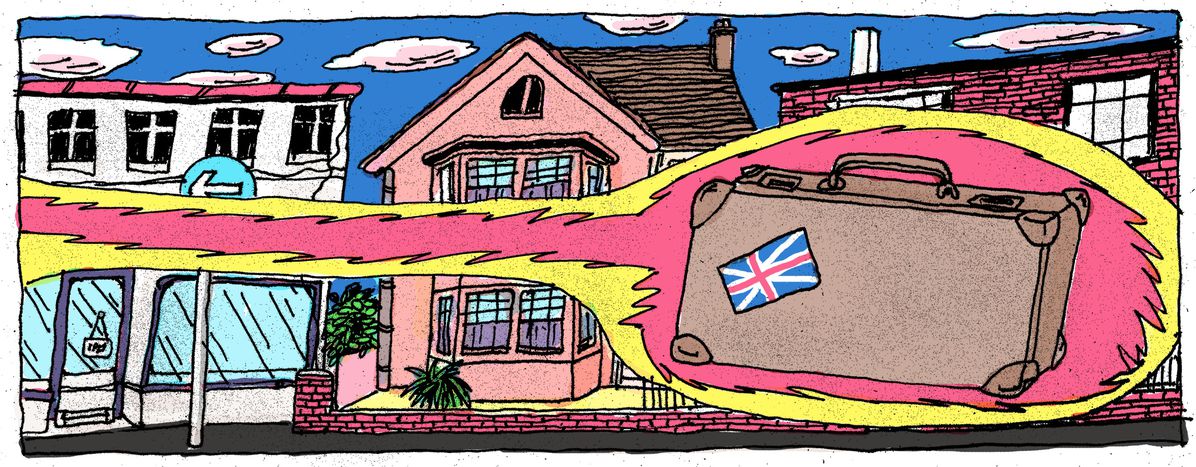
Behind the Numbers: 43% of Brits want to leave the EU
Published on
Translation by:
Phil W. BaylesIf initial meetings with trade partners are anything to go by, the Prime Minister is increasingly worries by the economic consequences of Brexit. Everything is up for grabs, but 43% of young Brits don’t want to stick around. They’re packing their bags and leaving in search of a more certain future.
On 4 September, Theresa May flew to Hangzhou in China, to meet her international counterparts at the G20 summit of world leaders. It was the first major diplomatic meeting to involve the UK’s unelected Prime Minister since she took office on 13 July. But if the former Home Secretary profited at all from China’s power play at the event, it was also marred by plenty of false notes during her meetings with other world leaders.
In the space of 48 hours Theresa May met Xi Jinping, Barack Obama, Vladimir Putin, Shinzo Abe and Narendra Modi. One topic dominated the agenda: Brexit, and more precisely the uncertainty surrounding the UK’s future trade deals. Leaders have been pretty direct in voicing their concerns. Japan, for example, has already warned that it could withdraw its banking and car manufacturing ventures from the UK as it leaves the EU.
Obama, Xi and other leaders have remained sceptical during this diplomatic dance with Mrs May. Not really sure of where to put her feet, she gave a press conference on 5 September, starting by abandoning one of the key promises of her recent campaign. There will be no Australian-style “points system” in the UK, where arriving workers are assessed on their professional experience, qualifications or language skills. Strongly pushed by Boris Johnson, the system was one of the key pillars of the Leave campaign before the Referendum on June 23 - as was the promise of an extra £350 million per week to spend on the NHS, also swept away be the new Prime Minister. With the world watching, May admitted that there would be “difficult times ahead” for the UK economy.
Though May seems intent on honouring the results of the vote in June, we still don’t know whether Brexit actually means Brexit. Back home, many feel that the Prime Minister is losing momentum - a feeling that is only adding to the confusion of many Britons who are no longer sure whether the country really will leave the EU. 4 million people have signed a petition calling for a second, clearer referendum, and a study by the BBC has found that 43% of UK citizens aged 18-34 admit that they want to leave the UK.
“The cherry on top of the big, racist cake the UK has become”
Colin, a 33-year-old entrepreneur from Manchester, is heading to the Netherlands. He’s considered leaving the UK for a long while, and if Brexit wasn’t the deciding factor it certainly made that decision easier: “When the vote happened it definitely helped make my mind up. It was the cherry on top of the big racist cake that the UK has become.”
It also convinced Gomitre to take the plunge and move to France. Born in Mauritius, the 25-year-old spent 12 years in the UK; plenty of time to experience “the bullying, the racism, the lack of open-minded people. Brexit has only amplified those things. I can’t do it any more,” he sighs. As a Millennial there’s another significant factor in Gomitre’s decision - the cost of education. While a year of study in France or Germany costs next to nothing, in the UK a Masters degree can cost as much as 9,000 euros. “I’d like to experience other parts of Europe and the world… But what’s certain is that I’ll leave the UK by the end of the year.”
Neither Colin nor Gomitre feel particularly saddened by their decision. Despite the vagueness of May’s rhetoric following the referendum, neither of them believes that she will suddenly do a U-turn on the issue. Colin says that it would be “amazing if there was a chance that we could still remain in the EU, but unfortunately I think it is very unlikely with the Conservative government and xenophobic hysteria we have in the UK right now.”
“Yes the 48% are very angry,” says Gomitre, “but all the matches and rallies won't change anything.” For those who are no longer enamoured with the UK, its future seems sad and uncertain: a runaway train without a driver.
“You would think after the damage to the UK and world economy, the job losses, loss of investment, that some people might realise how big a mistake they made and change sides,” Colin concludes. “But unfortunately people in the UK can be very stubborn and will stick to their opinion even if they know it is destroying the country and the prospects of young people.”
Which begs the question: is Mrs May as stubborn as that?
Translated from Brexit : entre qui-vive et sauve-qui-peut



